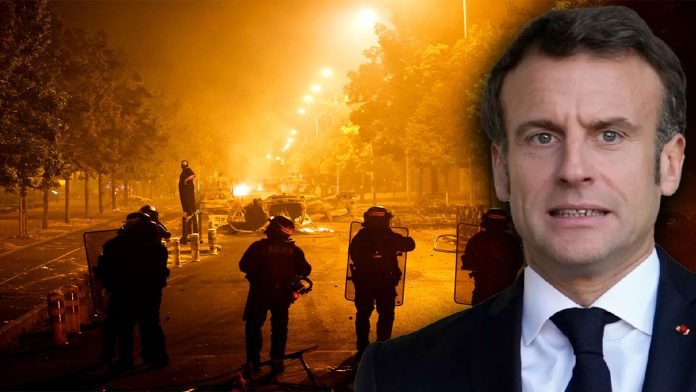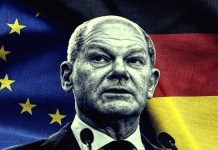France in Turmoil: Riots and Unrest Grip the Nation Following Police Shooting
The streets of France have descended into chaos as the nation grapples with a wave of riots and violence that shows no signs of abating. The catalyst for this widespread unrest was the fatal shooting of 17-year-old Nahel M. during a routine traffic stop in the Paris suburb of Nanterre.
As the country enters its third day of protests, President Emmanuel Macron finds himself facing a nation on the edge, desperately seeking solutions to quell the flames of anger and frustration.
In response to the escalating situation, Macron held a crisis meeting, where he denounced the “unacceptable instrumentalisation” of Nahel’s death. However, his plea for parents to keep their children at home fell on deaf ears as the protests intensified. The president acknowledged that violent groups were behind the riots, but also noted the involvement of many young people, reflecting the deep-rooted discontent simmering beneath the surface.
The scenes of violence have unfolded in various cities across France, including Marseille, Bordeaux, Lyon, Grenoble, Annecy, Toulouse, and Saint-Etienne. The unrest has been fueled by longstanding complaints of police violence and systemic racism within law enforcement agencies. Rights groups and residents of low-income, racially diverse suburbs have long decried the mistreatment and discrimination they face at the hands of the police.
As authorities mobilized a staggering 45,000 police and riot officers, including the elite Raid squad, the violence continued unabated. The Interior Ministry reported 875 arrests overnight, with more than half of them concentrated in Paris and its inner suburbs. Despite these efforts, the unrest shows no signs of dissipating, leaving the nation grappling with the question of how to restore order and address the underlying issues that have brought the country to the brink.
saw an Arab face, a little kid, and wanted to take his life.
Nahel’s mother
The incident that sparked these protests, the shooting of Nahel M., has raised troubling questions about the conduct of the police and the treatment of minority communities in France.
Initially, the police claimed that Nahel had driven his car at them, justifying their use of force. However, a video emerged and quickly spread across social media, showing a different narrative.
In the video, two policemen can be seen standing by the stationary car, with one threatening the young driver, uttering the chilling words, “You are going to get a bullet in the head.” The subsequent firing of the weapon as the car sped away only added to the mounting anger and resentment.
It wasn't a shooting.
— boomed 🗻 (@boomed__) June 29, 2023
Nahel has deliberately been killed at closed range by cops, just after being punched many times by his colleague saying "shoot him".
Don't trust the criminals : pic.twitter.com/kNstUCv10k
In the face of this unrest, Macron finds himself at a crossroads. Calls for him to declare a state of emergency are growing louder, as opposition members demand swift and decisive action. Macron, however, stopped short of taking such a step during the crisis talks. Prime Minister Élisabeth Borne has kept all options on the table, acknowledging the gravity of the situation.
The Interior Ministry confirmed 875 arrests last night – 408 of them in Paris and its inner suburbs. It plans to deploy “additional means” to contain the unrest on Friday.
Macron stopped short of declaring a state of emergency during the crisis talks, as members of the opposition are demanding. Prime Minister, Élisabeth Borne, had said hours earlier that “all hypotheses” are open.
As France grapples with the aftermath of Nahel’s death and the resulting protests, it is clear that the nation is in dire need of introspection and change. The wounds of injustice and inequality run deep, and it is crucial that the government takes meaningful steps to address these longstanding grievances.
The fate of a nation on the edge hangs in the balance, and only time will tell whether this incident esculates into a running battle with the police and race riots throughtout France or a path towards healing and reconciliation.
Support Independent Journalism Today
Our unwavering dedication is to provide you with unbiased news, diverse perspectives, and insightful opinions. We're on a mission to ensure that those in positions of power are held accountable for their actions, but we can't do it alone. Labour Heartlands is primarily funded by me, Paul Knaggs, and by the generous contributions of readers like you. Your donations keep us going and help us uphold the principles of independent journalism. Join us in our quest for truth, transparency, and accountability – donate today and be a part of our mission!
Like everyone else, we're facing challenges, and we need your help to stay online and continue providing crucial journalism. Every contribution, no matter how small, goes a long way in helping us thrive. By becoming one of our donors, you become a vital part of our mission to uncover the truth and uphold the values of democracy.
While we maintain our independence from political affiliations, we stand united against corruption, injustice, and the erosion of free speech, truth, and democracy. We believe in the power of accurate information in a democracy, and we consider facts non-negotiable.
Your support, no matter the amount, can make a significant impact. Together, we can make a difference and continue our journey toward a more informed and just society.
Thank you for supporting Labour Heartlands












